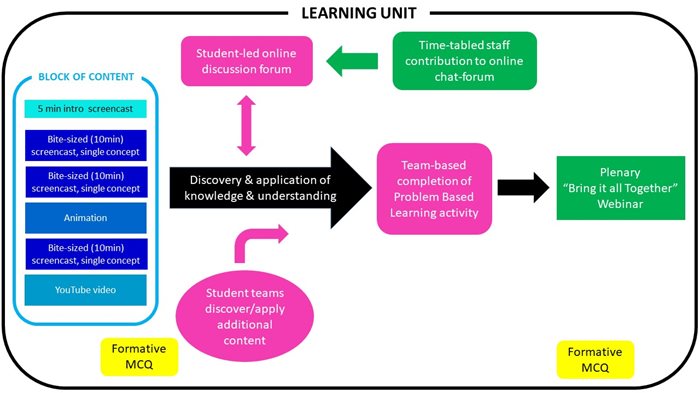COVID-19 has fundamentally changed the worlds of education and work, perhaps forever. Remote working and virtual conferencing will be more common. Student expectations of their learning have changed. Employers will require graduates with different knowledge and skillsets. Higher education providers, facing significant financial constraints, will be looking to provide high-quality education with decreased resources.
There will be no return to the old ways! Instead, there will be new norms and expectations, for both education and the workplace. We have a unique opportunity to collectively revamp our educational provision, to re-think operating models, to move from a content-driven to a more personal and professional development approach. In short, to better prepare our students for the 21st century workplace.
Taking and retaining the best from the rush to remote provision
Lockdown precipitated a rush to remote delivery. It also brought to the fore a need to rethink modes of provision, the educational benefits and versatility of eLearning resources, and the full potential of learning management systems (LMS) and virtual learning environments (VLE).
Students were forced to learn in less-than-ideal surroundings, asynchronously and without the support of their friends. Digitisation of previously face-to-face activities was not the solution. To mitigate these constraints, we shifted (often without realising) to a distributed model of learning: asynchronous activities that students could participate in at a time and pace of their choice, independent and team-based learning – the latter to facilitate collaborative learning, peer support and a sense of social belonging.
Electronic or eLearning resources form a key component of distributed learning. They come in many different forms: screencasts, videos, audio podcasts, animations, simulations, instructional videos, large, publicly available datasets, and data mining, analysis and visualisation tools, to name but a few. When used appropriately, they provide an inspiring and engaging educational experience, promote knowledge and understanding, and develop key skills and graduate attributes.
During lockdown, LMS and VLE platforms became more than simple repositories of content. They were the hub of operations and the glue that cemented everything together to provide a seamless learning journey for students.
So, the future?
We cannot return to our old ways. We need to retain and build on the best learning from our COVID educational adventures. Blend them with more traditional educational activities in a distributed model of learning, with the different tools and technologies smoothly integrated together.

Critical to the success of this model is a clear and seamless learning journey for students. In the schematic above, all educational resources and activities related to a specific topic within a module are packaged into a learning unit within the LMS or VLE. As depicted, it is purely for remote delivery. But it doesn’t have to be. The initial screencasts and final webinar could easily be replaced by traditional face-to-face lectures and a seminar.
At the front and centre of this model is a team-based, problem-solving exercise designed for students to work collaboratively with their peers. The aim is for them to integrate and apply knowledge and create mutual understanding and, in so doing, develop a sense of (social) belonging, experience team-working, and gain leadership and other key skills.
The learning journey begins with the provision of learning outcomes and essential content (e.g. screencasts, lectures, animations, videos). Students apply this, in teams, to the problem-solving exercise, discovering and applying additional content as required. They share their thoughts and ideas with other teams via online discussion forums, moderated by academics who don’t provide the answers but point them in the right direction. Students then have the opportunity to check their knowledge and understanding with formative multiple choice questions. The journey ends with a plenary seminar or webinar, where the learning is put into the context of their discipline or the real world.
What about practicals?
This model could equally apply to practicals, replacing stale, unengaging, recipe-driven practicals with team-based mini-projects. Placing the focus on experimental design and the testing of hypotheses, rather than just the development of technical skills. Shifting the learning from within the practical to occurring predominantly in pre-practical activities.
Students would work in teams to create hypotheses to address a research question, increase their knowledge and understanding through instructional videos, eLearning technology platforms and other resources. They could then share ideas with other teams, before designing a study to test these hypotheses using simulations, data mining and analysis tools, publicly available large datasets or in live laboratory sessions.
A new (educational) world
We need to seize this opportunity to create contemporary programmes that are attractive and inspiring to students, that better prepare our graduates for the 21st century workplace and enable UK higher education, as a sector, to compete in what will be a challenging global education marketplace. Change may be forced on us as universities rethink operating models and the marketplace changes, with US-style ‘pick-and-mix’ degrees, hyflex models of provision, an increased demand for lifelong learning and continuing professional development educational opportunities. We can’t afford to be left behind. It is better to lead than be led.
Comments
If you are a British Pharmacological Society member, please
sign in to post comments.